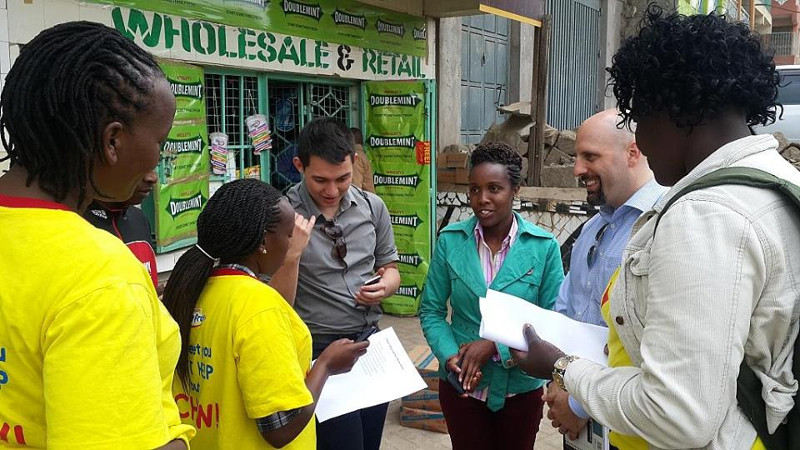Have you ever wondered how much easier travel has become, thanks to the digital innovations shaping our world? Exploring new destinations used to mean…
Debate rages over whether VC investors biased towards expat-founded startups

Concern is brewing over the large number of venture capital (VC) deals in East Africa involving expat founders — with both local and foreign entrepreneurs in the region weighing in in recent months over whether venture capitalists have a clear bias towards investing in tech startups that count foreigners among their founders.
In all, four of the five VC deals Ventureburn has reported on in East Africa so far this year have involved startups founded by expats — with the latest being Sokowatch‘s $2-million deal involving 4Dx Ventures (the founders are pictured above — see the story here).
Earlier this year, Kenyan tech site Techmoran reported (paywall) that although startups like Fuzu, Twiga Foods, M-Kopa, and Zumi were based in Kenya, they were registered elsewhere by expat founders.
“Raising $10 000 for an average African youth is extremely tasking (difficult — Ed) as compared (to startups with expat founders),” said Kenyan tech entrepreneur Annstella Mumbi.
For Mumbi, who is the co-founder Nuovo Technologies, expats understand the “small secrets” behind successful startups and that they have better access to information than locals do. She adds however that it’s not just expat founders — local founders who are educated abroad have a similar advantage as expats do.
Local, foreign entrepreneurs in East Africa weigh in on debate over whether venture capitalists biased towards investing in tech startups founded by expats’
For Steve Nyaundi, co-founder of Nairobi-based mobility startup iRideNairobi, VCs are more keen on investing in startups founded by expats because their founders have a better grasp of what is required to attract VC funding.
Startups founded by expats, he says, often have proper accounting structures in place, have legal expertise and a good understanding of the markets they operate in which allow them to raise funding early on.
“Having expat founders is also in a way viewed (by funders) as a more secure way of assuring return on investment (ROI) as it is assumed that the expats have an understanding of how international finance works,” he believes.
‘Better networks’
Expat founders acknowledge that being a foreign entrepreneur often makes it easier for them to attract funders.
One of these is Sona Shah, a US citizen who runs a healthtech startup Neopenda in Uganda.
“Because our team has feet in both the United States and Uganda, we have strong networks in US healthtech and startup hubs like Chicago and New York, which allows for opportunities such as competitions and prizes, and access to networks of investors of different types,” said Shah.
Last month, Olivia Zank, a Danish expat who co-founded Rwandan factoring firm BeneFactors told Ventureburn that expat founders have “easier access to external funding” as well as more exposure to lean startup methods (see this story).
This, while M-Shule founder Claire Mongeau, who is from the US, told Ventureburn in April that foreign investors were biased towards “those that look and talk like them” (see this story).
‘Expats less risky’
DEMO Ventures CEO Tania Ngima says there is a widespread perception among VC investors operating in the continent that expat founders — because of things like networks, frame of reference, and exposure — “are less risky”.
She singles out a report released in June last year by Village Capital which indicated that 90% of disclosed investments over the past two years went to one or more European or North American founders (the report can be downloaded here).
The report does not mention anything such as investors basing their decisions on any particular favouritism to expats.
Rather it says in instances where startups have not generated sufficient traction, investors base their decision to invest in a startup on things such the company’s potential, the founders’ educational background or the founder’s networks.
Village Capital regional manager for Africa Adedana Ashebir declined to comment — saying she “won’t be able to give a comment this time”.
‘We’re not biased’
But venture capitalists say they are not biased towards investing in startups that have expat founders.
“They (VCs) are seeking to maximise their odds of finding the most innovative businesses that are solving key challenges in Africa in a sustainable and profitable way.
“Especially for VCs who have a rigorous due diligence process, it’s hard to bring in personal biases in the decision making,” says Beyond Capital CEO Eva Yazhari.
African Business Angel Network co-founder David van Dijk echoes this, saying VCs are “simply looking for the most investable deal”. He adds that expat founders usually have a more proven track record compared to local founders.
“Key here is that a lot of money is still foreign money. And I am not a psychiatrist but I can understand that people have a bias to invest in what they know. Someone who went to the same school, or belongs to the same club. This must especially be the case for early-stage investors,” says Van Dijk.
Savannah Fund managing partner and founder Alliy Mbwana, added that the absence of venture capital and private equity has driven a lot of tech startups (some of whom have expat founders) to search for it in Europe or the US where those with networks there are better able to source funding.
Mbwana pointed out that in the early years of Silicon Valley, to leverage of networks, many entrepreneurs who were of Indian descent resorted to teaming up with local Americans as they believed this would get VCs to take them more seriously.
‘Diaspora can help bridge the gap’
Should VC funds then be channelling more funding to tech startups with local founders and how should they do so sustainably?
The African Private Equity and Venture Capital Association research head Enitan Obasanjo-Adeleye believes the African diaspora can play a big part in helping channel funds to local entrepreneurs.
“By combining their understanding of the VC model with local knowledge, they can support the evolution and adaptation of the African VC industry and increase awareness and understanding amongst local investors,” she explains.
She adds that more needs to be done to educate local investors on VC opportunities so they better understand the risk profile, and local entrepreneurs on preparing their businesses for VC investments.
Ngima adds that local founders should “do the basic and often overlooked things” to assure investors. These, she says include being tax compliant, and good book keeping.
Van Dijk says more local investors need to be encouraged to invest in promising African entrepreneurs. “There is enormous wealth in Africa but that is still mainly invested in real estate or finds its way to overseas destinations. It is great to see the first local pension funds taking an interest,” he says.
Other investors are taking a different approach. Accion Venture Lab — a $10-million fund that provides seed funding and technical assistance to startups that are broadening financial inclusion — recently launched a new initiative in partnership with the Mastercard Foundation to identify and support Nigerian entrepreneurs who are building inclusive fintech startups from scratch.
Accion Venture Lab director of investments Amee Parbhoo explains that when the fund evaluates inclusive fintech startups, it’s “very important” that founding teams have deep experience and expertise in the local market.
“Often, this means that the founding team comes from that location. In the financial services industry, having local knowledge is critical for a business to build partnerships, hire teams, manage regulatory hurdles, and – ultimately – reach scale,” explains Parbhoo.
It is clear that there is much that still needs to be done to ensure that local entrepreneurs in East Africa take a greater share of VC investments.
Read more: Expat founders: So where are all the African entrepreneurs? [Opinion]
Read more: Expat founders have it easier than locals says Danish founder of Rwandan startup
Read more: Investors biased towards expat founders says American behind Kenya’s M-Shule
Featured image: Sokowatch founders Daniel Yu (third from left) and Josh Midldleman (second from right) in a 2015 picture (Sokowatch via Facebook)
Editor’s note (24 August 2018): GSMA Ecosystem Accelerator Insights Director Maxime Bayen pointed out in a post on LinkedIn on 22 August that the founders of Twiga are not all expats and that the company is in fact registered in Kenya.
In a post on Twitter on the same day, investor and author Jonathan Berman noted that Ventureburn had not mentioned two East African companies, which weren’t founded by expats and had raised significantly larger international funding this year than the startups mentioned in the article. These are Wanachi as well as Cellulant which raised $47.5-million — possibly the largest in Africa this year.
Jake Bright, who covers the African tech startup ecosystem for US tech publication Tech Crunch, also pointed out that Ventureburn had not included Nairobi-based Africa’s Talking which was founded by a local founder and raised $8.6-million.


